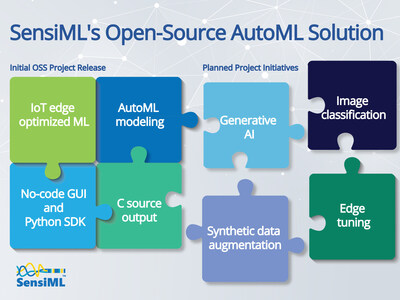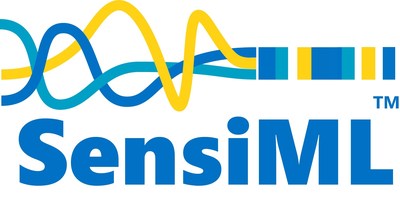SensiML Launches First Complete Open-Source AutoML Solution for Edge AI/ML Development
Rhea-AI Summary
SensiML, a subsidiary of QuickLogic (NASDAQ: QUIK), has launched the first complete open-source AutoML solution for developing edge AI/ML applications. This new release, part of SensiML's Analytics Studio, supports various edge processors and silicon vendors, aiming to enhance innovation and transparency in the IoT device developer community. The solution promises faster model creation, flexibility, and support for numerous time-series sensors. This initiative could significantly impact the projected market growth of AI-enabled edge devices, estimated to reach 3.5 billion units by 2027.
The solution offers platform-agnostic model generation, rapid innovation through community collaboration, and extensive model development capabilities. Users can choose between the open-source version and a fully managed SaaS cloud service. SensiML seeks to leverage the success of QuickLogic's previous open-source projects to democratize edge AI/ML development further.
Positive
- Launch of the first open-source AutoML solution for edge AI/ML development.
- Supports a wide range of edge processors and silicon vendors.
- Potential to impact a market projected to reach 3.5 billion AI-enabled edge devices by 2027.
- Platform-agnostic model generation, enhancing flexibility for developers.
- Supports numerous time-series sensors, including microphones, accelerometers, and gyros.
- Promotes rapid innovation through community-driven collaboration.
- Offers dual licensing model: open-source version and fully managed SaaS service.
- Enhances end-user flexibility and boosts SensiML's SaaS growth potential.
Negative
- No specific financial data or revenue projections provided.
- Potential risks of community-driven projects include inconsistent quality and support.
- Transition to open-source may face initial resistance from developers used to proprietary tools.
News Market Reaction
On the day this news was published, QUIK declined 3.58%, reflecting a moderate negative market reaction.
Data tracked by StockTitan Argus on the day of publication.
- Hardware-agnostic solution supports a broad array of edge processors and silicon vendors
- Establishes a foundation for community-driven edge ML innovation including generative AI, synthetic data generation, and edge learning
AutoML, or automated machine learning, simplifies and greatly speeds up the process of creating machine learning models. This makes machine learning more accessible to developers who may not have specialized data science knowledge. Building ML models for IoT microcontrollers and edge SoCs is particularly complex because it requires blending data science with embedded code optimization for devices with limited memory and compute power. AutoML helps overcome these challenges.
SensiML's trailblazing open-source offering promises to deliver enhanced creativity, innovation, and AI code transparency to the global community of IoT device developers and expands the company's access to the rapidly growing market projected by ABI Research to reach 3.5 billion AI-enabled edge devices by 2027. SensiML's Analytics Studio brings intelligent sensing capability to a broad range of IoT edge devices such as the following real-world application examples:
- Wearable devices and garments that analyze and coach proper human motion and ergonomics in real-time
- Predictive maintenance and anomaly detection sensors that recognize and react locally to faults in factory/plant machinery, pumps, and valves
- Building automation and security endpoints with acoustic event detection, keyword recognition, and speaker identification
Until now, IoT device developers undertaking what are often their first AI/ML projects have had to wade through a fragmented market of proprietary tools with varying capabilities and unclear roadmaps. The open-source release of SensiML's Analytics Studio marks a significant milestone for the IoT Edge AI software tools industry providing:
Platform Agnostic Model Generation: SensiML's plug-in style, open-source architecture supports a broad array of MCUs, AI/ML accelerated SoCs, and AI engines inspiring developer confidence to build ML datasets using flexible tools not tied to specific vendors, chipsets, or inference engines.
Time-Series Sensor Inputs: Provides support for all conceivable time-series sensors such as microphones, accelerometers, gyros, IMUs, loadcells, strain gauges, PIR sensors, and more. Inputs can be mixed for more complex models with sensor fusion algorithms.
Rapid Innovation: AI/ML's fast evolution demands an open-source approach to harness the broader developer community expertise, accelerating key innovations such as generative AI, synthetic data, and edge learning advancements.
Flexibility: Analytics Studio supports multiple model development mechanisms from point-and-click AutoML powered model generation, to code-free GUI-based modeling with full pipeline control, to entirely programmatic Python SDK model creation.
Extensibility: Analytics Studio provides model generation for basic feature-based models, regression models, classic ML, and deep learning neural networks. Its rich library of over 80 feature generators also includes the ability to easily add custom transforms, filters, features, and classifiers making it easy for community developers to enhance.
By transitioning to a dual licensing model that includes an open-source option, SensiML is offering up its IoT edge AutoML solution as a foundation code base built up over seven years to benefit the broader developer community for collaborative improvement and contribution. With community support, SensiML seeks to extend Analytics Studio to include:
- Generative AI model development and tuning
- Synthetic dataset augmentation
- Local LLM support
- Object recognition from image and video data streams
- Enhanced edge model tuning and learning
- More MCU, MPU, NPU, and GPU integrations / optimizations
- More pre-trained model templates for real-world use cases
New and existing users will have the flexibility to choose between SensiML's open-source version of Analytics Studio or its fully managed and supported SaaS cloud service implementation based on the same core technology.
"Four years ago, QuickLogic, our parent company, launched the first open-source eFPGA solution," said Chris Rogers, CEO of SensiML. "We are leveraging this success to democratize edge AI/ML development with our robust tools. This open-source initiative will accelerate edge AI/ML adoption, benefit end-user flexibility, and boost SensiML's SaaS growth and private-label tooling value for our growing list of industry partners."
Availability
SensiML will launch its public GitHub repository and AutoML engine documentation early this summer. Developers interested in receiving updates and becoming contributors to this pioneering technology can sign up at https://sensiml.com/blog/opensource.
About SensiML
SensiML, a subsidiary of QuickLogic (NASDAQ: QUIK), offers cutting-edge software that enables ultra-low power IoT endpoints that implement AI to transform raw sensor data into meaningful insight at the device itself. The company's flagship solution, the SensiML Analytics Toolkit, provides an end-to-end development platform spanning data collection, labeling, algorithm and firmware auto-generation, and testing. The SensiML Toolkit supports a growing list of hardware including 8/16/32-bit MCUs from Microchip®, Arm® Cortex®-M class and higher microcontroller cores, Intel® x86 instruction set processors, and heterogeneous core AI/ML optimized SoCs. For more information, visit https://sensiml.com.
SensiML and logo are trademarks of SensiML. TensorFlow, the TensorFlow logo and any related marks are trademarks of Google Inc. All other trademarks are the property of their respective holders and should be treated as such.
![]() View original content to download multimedia:https://www.prnewswire.com/news-releases/sensiml-launches-first-complete-open-source-automl-solution-for-edge-aiml-development-302144407.html
View original content to download multimedia:https://www.prnewswire.com/news-releases/sensiml-launches-first-complete-open-source-automl-solution-for-edge-aiml-development-302144407.html
SOURCE SensiML Corporation









